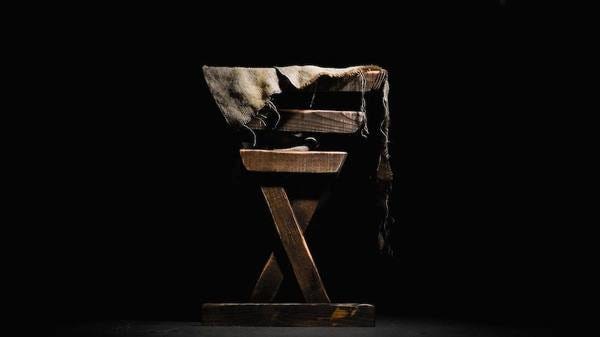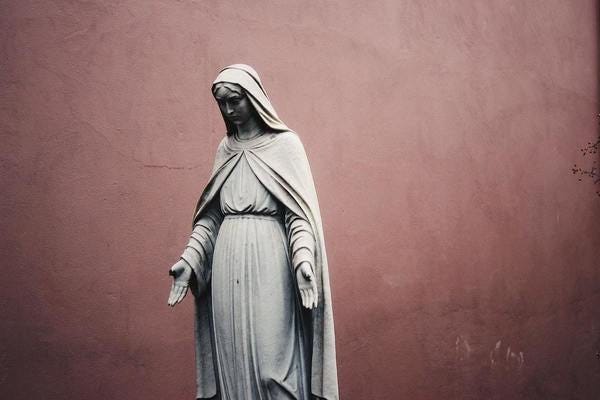The Lectio Letter - Issue #41 - Advent 2021 - Part IV - Learning from Mary that Hope takes Practise
O Lord Jesus Christ,
who at your first coming sent your messenger
to prepare your way before you:
grant that the ministers and stewards of your mysteries
may likewise so prepare and make ready your way
by turning the hearts of the disobedient to the wisdom of thejust,
that at your second coming to judge the world
we may be found an acceptable people in your sight;
for you are alive and reign with the Father
in the unity of the Holy Spirit,
one God, now and for ever.
Amen.
– An Anglican Collect for Advent
This is the Fourth Sunday of Advent. This season, instead of my regular loooong Lectio’s, I have sent out some short(er) thoughts to encourage us to live in God’s time, to live in the Christian Calendar. If you missed the last couple and are a paying member you can read them here (If you’re not, you can sign up now and read them, as well as get access to all 41 previous issues);
This is the last of the Advent reflections, I am so grateful for how many of you have tracked and sent me emails with your own thoughts. As we move towards Christmas(tide), I trust that waiting in Advent has deepened your hope, helped you see the importance of waiting in the dark to more truly appreciate the light of Christ dawning on us as Christmas approaches.
We’ve prayed this prayer, from the excellent prayer book Every Moment Holy, in our house as we look towards the beginning of theChristmas season, I trust you find it helpful too.
As we prepare our house for the coming Christmas season, we would also prepare our hearts for the returning Christ.
You came once for your people, O Lord, and you will come again.
There that was no room at the Inn to receive you upon your first arrival,
we would prepare you room
here in our hearts
and here in our home,
Lord Christ.
As we decorate and celebrate, we do so to mark the memory of your redemptive movement into our broken world, O God.
Our glittering ornaments and Christmas trees,
our festive carols, or sumptuous feasts–
by the small tokens we are firm that something amazing has happened in time and space–
that God, on a particular night, in a particular place, so many years ago, was born to us, an infant King, our Prince of Peace.
Our wreaths and ribbons and coloured lights,
Our giving of gifts, our parties with friends–
these have never been ends in themselves
They are but small ways in which we repeat that sounding joy first proclaimed by angels in the skies near Bethlehem.
In view of such great tidings of love announced
to us, and to all people, how can we not
be moved to praise and celebration in this
Christmas season?
As we decorate our tree, and as we
feast and laugh and sing together,
we are rehearsing our coming joy!
We are making ready to recieve the one
who has already, with opens arms, received us!
We would prepare you room
here in our hearts
and here in our home,
Lord Christ
Now we celebrate your first coming, Immanuel,
even as we long for your return.
O Prince of Peace, our elder brother, return soon. We miss you so!
Amen
A Child born on the Margins
During the Advent season, in contrast to the frivolity of a commercial Christmas, we pay particular attention to the final judgement of God which will come upon the injustice and oppression in our world. We do this in preparation to receive thejoy of Christ’s coming into the world as the beginning of God’s plan to make all things right through the life of His Son. Advent is a type of fast where we hold back from the positivity of Christmas to take an unflinching account of the darkness in our world. We begin theChristian year in the dark in order to fully appreciate the light of theChristmas season.
Jesus’ coming turns the world upside down. This is a grand claim for a baby, but in his very coming, the great gap between the divine and human is brought together in this child. Jesus is not born into privilege but into the context of a socially questionable conception and an oppressed people.
Women on the Margins
On this fourth Sunday of Advent, the Christian calendar points our attention to Mary, the Mother of Jesus, and to the Hope that she quite literally embodies for the sake of the world. The hope of theworld has been entrusted to a teenage girl in a backwater town.
God shows up in the margins.
As we take a look at the statistical realities of the injustices in our world this advent, it is not hard to see that historically, and today, women receive the brunt of the world’s injustice. Women throughout history have been consistently disregarded, harshly set aside, and roughly shoved to the margins. But the good news of theChristmas story is that the margins are where God, in Jesus, shows up to bring about freedom for the oppressed. As we look back through the Biblical story, we see many women (Ruth, Rachel, Esther, Naomi, Miriam and Jochebed to name a few) all playing key roles in Israel’s history and ensuring the purposes of God were fulfilled.
We need to re-discover the women of the Bible as those deeply worthy of emulation if we are to truly capture the witness and countenance of our Christian faith in our contested age. We see that in the scriptures, Christians (male and female), are called to take on traits and even identities considered culturally as masculine and feminine. If women aspire to be “Sons” (with all the inheritance-based significance it holds), then men need to aspire to fulfil our role as “the Bride” (with all the receptivity and preparedness that image cultivates).
So can fresh attention on Mary this Advent help?
We're afraid of Mary
As evangelicals, we have often sidelined Mary due to our suspicion that the Roman Catholic tradition has venerated her to the point of worship. Whether or not that is the case is not something we have space to explore here, but the impact of this suspicion means that we disregard all attention to Mary, highlighting instead her virtuous fiance Joseph. But Mary is the crescendo of a litany of women throughout the Biblical story who emerge from the sidelines to play key and pivotal roles in God’s salvation history.
It is almost impossible to perceive the significance of the Christmas story without taking into account the previous acts of God’s work in the world through the scriptures. The Exodus, in particular, was a key event that was clear in the minds of the Jewish people in Mary’s day. Indeed, Jesus’ own life acts like a condensed re-enactment of the Exodus story. Moses, who will lead Israel’s deliverance from Egypt, starts out being delivered from Pharaoh’s infantcide by his mother (Jochebed) and sister (Miriam) into a kingly status by Pharaoh’s daughter. In the same way, Jesus is delivered from Herod’s slaughter through Mary and Joseph’s journey into Egypt.
In the Exodus, God parts the seas for the people of Israel to be saved and continue into their wilderness for 40 years. When Jesus emerges into his public ministry, his body separates the waters in his baptism before he goes into the wilderness for 40 days. Jesus’ whole life echoes the Exodus, the primary story of God’s deliverance which rooted the Jewish self-understanding.
Mary knew "Hope takes Practise.."
This Exodus story is no doubt swirling in the mind and heart of a young Mary in the midst of the angel’s announcement.
When we encounter her, Mary is a picture of vulnerability. An unwed and yet betrothed teenager, she responds to the angel’s announcement with bravery and tenacity. Mary, in her youthfulness, responds with incredible words which echo down to us ringing with a deep spiritual maturity which has been cultivated by practising her people’s hope;
“I am a servant of the Lord. May it be done to me according to your word.”
– Luke 1
Mary, like all teenage girls throughout history, would have been painfully aware of the predicament a pregnancy outside of wedlock would put her in, yet her response is receptive. In our world, we celebrate people who ‘make things happen’ and demonstrate a kind of willfulness. In Mary, we find someone who is not willful, but willing. Willingness is an openness to others whereas willfulness simply pursues our own ambition. What would it take to cultivate a kind of willingness for the purposes of God to unfold in our own lives, even if it endangered the things we hoped for, as it did with Mary in her betrothal to Joseph?
Willful or Willing?
As I have mentioned in previous emails, Advent means “coming” or “arrival.” It is a rehearsal of the first coming of Christ in the manger and an expectation of his second coming. But there is a third type of coming when we are said to be born again by the Spirit of Christ taking up residence within us. This is not an act of willfulness on our part, as we are unable to force our way into a life that receives Christ. Instead, we practise a willingness and an openness to be theplace where Christ can dwell by his Spirit, so that Christ’s life and body might be seen through our lives and bodies. We receive Christ with much the same willingness as Mary showed and, just like Mary, the implications may deeply complicate our lives.
But in the midst of the complications of the announcement for Mary, she goes to visit Elizabeth and sings (or speaks out) what we now know as the Magnificat;
“My soul magnifies the Lord, and my spirit rejoices in God my Saviour, for he has looked on the humble estate of his servant. For behold, from now on all generations will call me blessed…“
How can Mary, at a great personal cost, delight in the ways of God and consider herself blessed? Because she lives a life that has rehearsed the hopes and longings of her people. The Jewish people had been delivered from Egypt, but their current occupation by theRomans was another state of oppression for which they needed God’s further deliverance. In the midst of this, they continued to tell, sing and pray the story of God’s deliverance in the past to cultivate hope for the future. They knew that hope takes practice.
So for us today, in this season of Advent, we practice looking back at what God has done, and we enter into this coming week with hope, knowing the God we see in the manger is the One who was, and is, and is to come. We look back to cultivate hope for the future and become, by God’s Spirit, beacons of that hope today wherever we place our feet, wherever our hands reach out to help, and wherever our voices can be heard.
There is hope. God has come, and will come again.
Advent begins the year for Christians, even as our secular calendar comes to its end. We start out this Christian year as Mary did, practising hope for the future by rehearsing the past goodness of God. As we do that, we prepare ourselves for the moments in this coming year when, like Mary, God breaks into our lives with a call. This call could cost us everything, but by rehearsing the story we will have cultivated space for the Spirit to form the heart of Christian maturity within us. A heart that can in every circumstance respond with Mary:
“I am a servant of the Lord, May it be done to me according to your word.”
Liam








